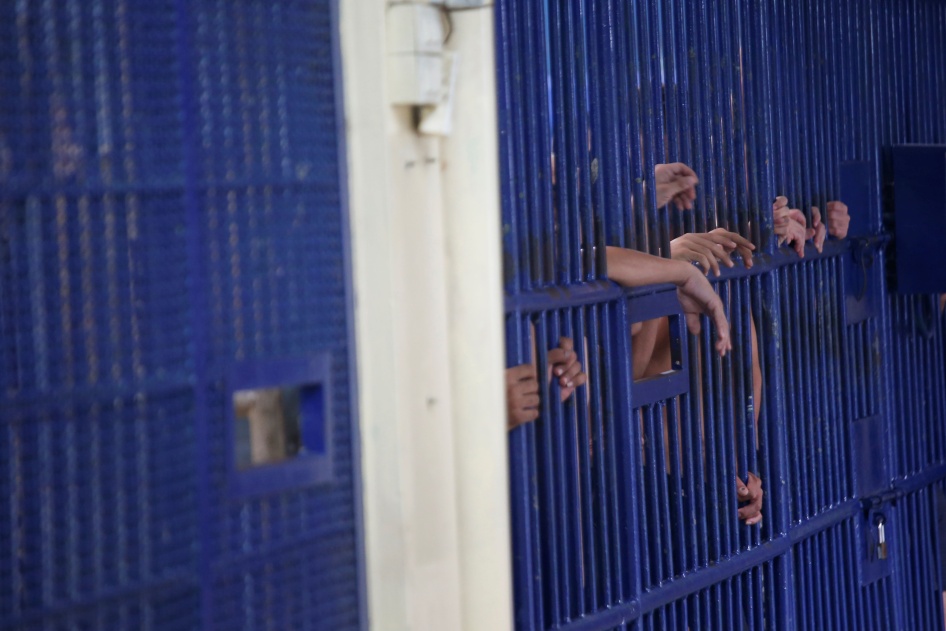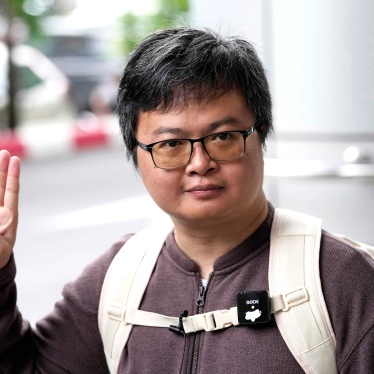Few people realize that Thailand has been holding more than 40 Uyghur asylum seekers in immigration detention for a decade. The danger to this remaining group is real. The new government of Prime Minister Srettha Thavisin should free these forgotten people, who fled dangerous conditions in China, and arrange for their resettlement in a third country.
Ten years ago, on March 13, 2014, Thai immigration officials patrolling in Songkhla, near the Thai-Malaysia border, arrested a group of 220 persons in the jungle, kicking off this saga that continues today. In July 2015, Thai authorities forcibly returned 109 ethnic Uyghur men from immigration detention centers across Thailand at the request of the Chinese government.
Without giving the Uyghurs any opportunity to seek asylum, as required under international human rights law, the authorities rounded those 109 men up from detention centers around the country and handcuffed, blindfolded, and handed them over to Chinese officials in Bangkok. Beijing sent a plane with Chinese police officials to pick them up, and during the handover, treated the Uyghurs like dangerous criminals, degrading them, and filming them in blindfolds and handcuffs. The men then disappeared into China’s opaque, abusive penal system, never to be seen again.
At that time, Thailand chose to keep approximately 50 Uyghur men in their custody—leaving them to languish in indefinite detention. Now more than ten years after they were first detained, at least 43 Uyghur men remain in Bangkok’s Suan Phlu immigration detention center today. Immigration authorities have repeatedly refused access to the United Nations Refugee Agency, UNHCR, denying the men’s right to recognition of their refugee status, despite the fact that all of them have long ago completed their sentences for illegal entry into Thailand.
In May 2014, the Chinese government launched an abusive “Strike Hard Campaign against Violent Terrorism,” which escalated in 2017. An estimated one million Uyghurs and other Turkic Muslims in Xinjiang were arbitrarily detained and imprisoned at the height of the campaign, subjected to mass surveillance, forced labor, forced separation of families, and other abuses.
Though purportedly to counter terrorism, the campaign involved arresting and detaining people for lawful activities such as receiving phone calls from abroad or using WhatsApp on their phones. In 2022, the United Nations said the conditions in Xinjiang “may constitute international crimes, in particular crimes against humanity.”
As part of that campaign, the Chinese government has acted against Uyghurs who have fled abroad. Since 2014, Thai authorities have arrested as many as 350 Uyghur men, women, and children fleeing persecution in China. While Bangkok allowed over 170 women and children to leave Thailand for Turkey, in line with that group’s wishes, it has applied a wholly different, rights abusing treatment to the Uyghur men it holds.
In addition to the Uyghur men who remain in Thai immigration detention, another five are serving criminal sentences linked to their attempt to escape immigration detention in northeastern Thailand’s Mukdahan province. After they complete their sentences, it is expected they will be returned to indefinite immigration detention. For all the Uyghurs who remain detained in Thailand, Thai immigration authorities have denied them access to lawyers, family members, humanitarian groups, and others. Conditions inside Thailand’s immigration detention centers are extremely overcrowded and unhygienic. Detainees lack adequate food, water, and proper medical services.
Detainees in Thailand’s immigration detention centers are frequently confined to open cells, some of which have over 100 people crammed together. In the past, children have been imprisoned alongside adults, creating a litany of social protection hazards. In 2019, senior government officials, including then Deputy Prime Minister Prawit Wongsuwon, signed a Memorandum of Understanding that agreed to refrain from detaining children, but in some cases children still have been detained.
Migrants who were able to leave the Suan Phlu immigration detention center have spoken about beatings and other forms of abuse and mistreatment they experienced or witnessed. Members of nongovernmental groups and lawyers working on cases related to the Suan Phlu detention center have corroborated these conditions. To date, successive Thai governments have not shown a genuine interest in addressing these serious problems.
Some witnesses said that the Uyghurs had it worse than other detainees. A 2023 VICE News article quoted another detainee as saying, “They were pretty much treated like terrorists…They were not allowed visits, could not receive money, and were not allowed to use mobile phones. Their leaders were punished if immigration authorities found out if they were using a mobile phone.”
In April 2023, a 40-year-old Uyghur detained in Suan Phlu, Mattohti Mattursun, died after being taken to the hospital with liver and respiratory problems. He is the fifth Uyghur asylum seeker to die in Thai detention in the last 10 years. Others include Aziz Abdullah, a 49-year-old Uyghur asylum seeker who died from pneumonia in the same detention center in February 2023; a 27-year-old man, of cancer in 2018; and in 2014, a new born baby and a 3-year-old.
If Thai authorities provided appropriate access to health care, access to lawyers or other refugee assistance agencies, these deaths could have been prevented. But the Uyghurs were walled off from support and left to languish in detention as part of an apparent strategy to partially appease the Chinese government, which continues to demand that Thailand should forcibly return them to China.
While the Thai government fears hurting its relations with the Chinese government, it is also concerned about the negative international reaction it faced in 2015 when it sent back the 109 others. A coalition of governments – including the US, Canada, and the European Union and its member states – are rightly continuing to urge Thailand to release the remaining Uyghurs it holds and allow them to travel to a safe third country.
As a party to the UN Convention against Torture and Other Cruel, Inhuman or Degrading Treatment or Punishment, Thailand is legally bound not to send anyone to a place where they would be at risk of being tortured.
Furthermore, in February 2023, Thailand’s own Act on Prevention and Suppression of Torture and Enforced Disappearances entered into force. The law states that authorities shall not “expel, return, or extradite a person to another State, if there are substantial grounds for believing that the person would be in danger of being subjected to torture, to cruel, inhuman, or degrading treatment, or to enforced disappearance.”
The government of Prime Minister Srettha Thavisin should take the option of returning the Uyghurs to China off the table and recognize Thailand’s obligations under the Convention against Torture. It should release the remaining Uyghurs, let them reunite with their families and allow them to travel to a safe third country.










